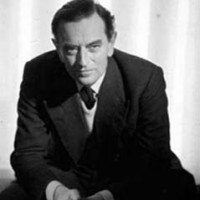David Lean
23.03.1908, Croydon, UK - 16.04.1991, London, UK

1908 in Croydon, Great Britain. He died on April 16th 1991 in London. He came
from a Quaker family and as a boy he was not allowed to go to movie theaters.
From 1922 he began to work in the film industry. At first he worked in many
different helping positions (announcer of the beginning and ending of scene
takes, courier, as well as tea server for the directors!). From 1930 worked as
an editor. In the beginning he edited the film news, and from 1934 he
worked as editor of films in the Elstree studio (so, among others, he
edited films by Anthony Asquith and Leslie Howard, as well as Michael Powell and
Emeric Pressburger). He made his directing debut, together with the British
writer and screenwriter Noel Coward, in the film In Which We Serve in
1942, which was nominated for the Oscar as the best film. Next year with his
future co-screenwriters Ronald Neame and Anthony Havelck-Allan, he founded their
company Cineguild in whose production he made This Happy Breed in
1944, Blithe Spirit in 1945 and Brief Encounter in 1946, which was
his first international success. All these films were adaptations of short
stories or theatre plays by Noel Coward, who co-wrote them as well. After the
success of the Brief Encounter he adapted for screen two literary works
by Charles Dickens – The Great Expectations, 1946, for which he was
nominated for an Oscar (best director and screenplay) and Oliver Twist
(1948) – which brought him more success and reputation. After that he directed
three films starring Ann Todd, his wife at the time - The Passionate Friend
(1948), Madeleine (1949) and The Sound Barrier (1952) for which he
was awarded by the British Film Academy for the best film and best
director. In 1954 he made a successful comedy Hobson's Choice. Then
followed the melodrama Summertime (1955), his first film shot outside of
Great Britain. For this film he was nominated for the Oscar in category best
director. Until 1984 he made five spectacular films, equally successful among
critics as well as the audience – The Bridge on the River Kwai (1957), which won
7 Oscars (among other for best film and director); Lawrence of Arabia
(1962), also won 7 Oscars (once again for best film and director); Doctor
Zhivago (1965), nominated for Oscar in category of best director; Ryan's
Daughter (1970), a film that won the Oscar for best cinematpgraphy and
best supporting actor (John Mills); A Passage to India (1984), a film he
prepared for a long time, and finished after a fourteen years long break, for
which he received several nominations and an Oscar for best film and best
director. David Lean died at the age of 83. Death interrupted him in his work on
his new film Nostromo, an adaptation of the novel by Joseph Conrad.
Filmography
A Passage to India (1984)
Ryan's Daughter (1970)
Doctor Zhivago (1965)
Lawrence of Arabia (1962)
The Bridge on the River Kwai (1957)
Summertime (1955)
Hobson's Choice (1954)
The Sound Barrier (1952)
Madeleine (1950)
Passionate Friends, The (1949)
Oliver Twist (1948)
Great Expectations (1946)
Brief Encounter (1946)
Blithe Spirit (1945)
This Happy Breed (1944)
In Which We Serve (1942)